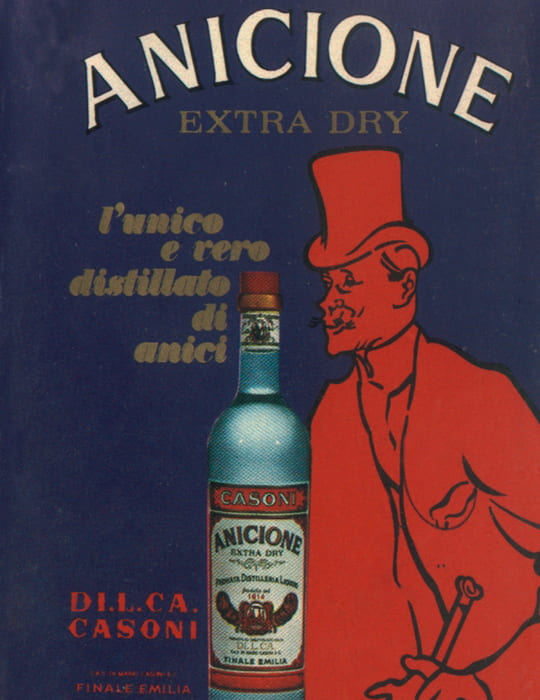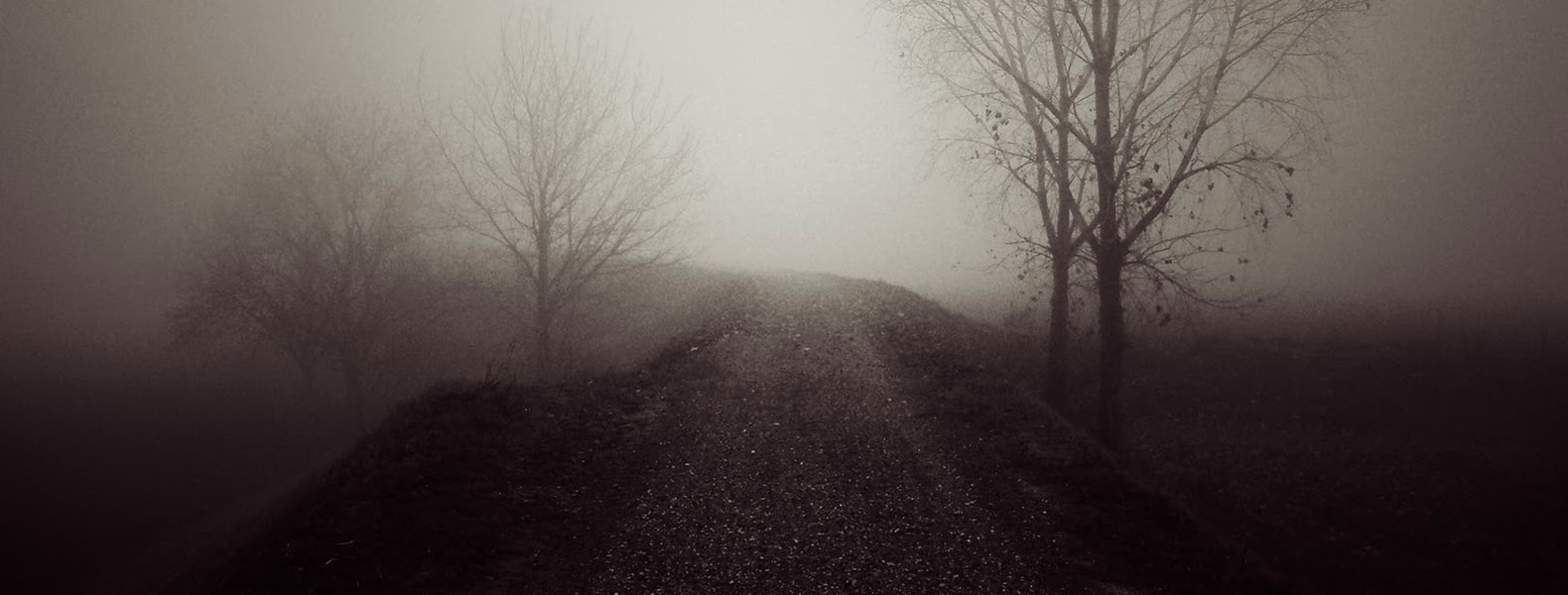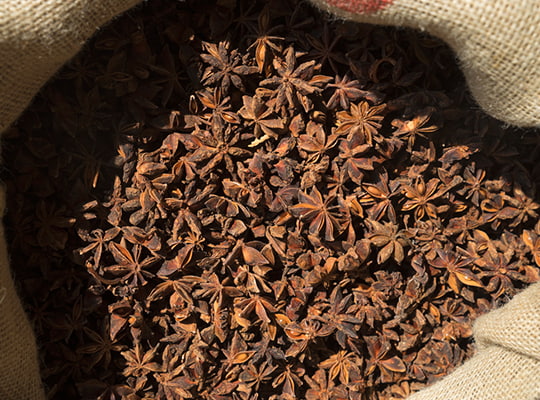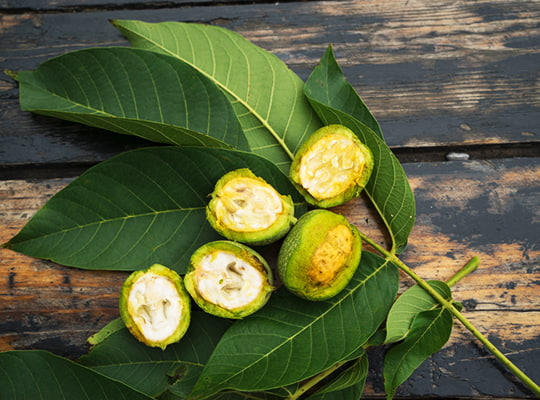
PRODUCTION OF LIQUEURS AND ALCOHOLIC DISTILLATION: CASONI, SINCE 1814
Casoni spirits and liqueurs are created from the finest raw materials and continuous research into new ingredients. This is how the company manages to ensure the uniqueness and authenticity of the more than 100 infusions that it makes for more than 450 different recipes. These are significant volumes, to which we should add the use of specific machinery for the production of liqueur and extensive capability to work with different formats —now more than 60 — in timelines calibrated to fit in with market needs
Deep knowledge and expertise cultivated by more than 200 years of experience in the production of renowned Italian liqueurs typical of the region where Casoni has grown, such as, for example, the famous Anicione.

THE PILLARS OF CASONI'S LIQUEUR PRODUCTION
• THE SUCCESS OF ANICIONE CASONI
The backbone of the Giuseppe Casoni distillery is the famous Anicione Casoni, which since the beginning of its production has brought the company numerous awards at the most prestigious national and international exhibitions. The "spirito d'anice" (anise spirit), the secret production technique for which the family jealously preserves, is the oldest Casoni signature recipe: a very particular liqueur, dry, with exceptional purity; an infusion of aniseed which makes it ideal in coffee or as a special ingredient of all kinds of cocktails.
• BEYOND LOCAL TRADITIONS
Casoni, in addition to the traditional products of its own region, is also known for the production of traditional liqueurs typical of other regions in Italy. Among these, one of our favourites is the Limoncello di Sorrento IGP, a lemon liqueur with a rich fresh aroma obtained from the infusion in pure alcohol of the skins of the exquisite Sorrento oval lemons produced in the famous Campania peninsula region in southern Italy.
MORE THAN 450 LIQUEURS
The company's strength is the ability to produce and interpret the needs of customers certified by the production of more than 400 labels between branded products and own label products. A goal achieved thanks to the professionalism and ability of our company to interpret the market needs of customers around the world. Learn more about third-party production.

WE STILL MAKE OUR LIQUEURS RIGHT HERE WHERE WE BEGAN. BUT NOT ONLY HERE.
The main production plant is located in Finale Emilia in the province of Modena, a region where Casoni was founded over 200 years ago. The family business of then has now become a global benchmark in the liqueur and distilled spirits market. The main building covers an area of 15,000 sqm which houses our offices, our laboratory and production site. The plant has a bottling capacity of about 60,000 bottles per day and the storage area can accommodate about one million bottles at any one time, all ready to be distributed worldwide, as well as being equipped with a photovoltaic system which produces about 350,000 kWh of electricity per year.
There is a second production facility in the Slovak Republic with a production capacity of four million/bottles a year strategically positioned to distribute the products in Eastern Europe.

DID YOU KNOW? DISCOVER THE ORIGINS OF OUR 200 YEARS OF PRODUCTION

• FINALE EMILIA, THE LAND OF AQUAVIT THAT INSPIRED THE CASONI FAMILY
Since the Middle Ages, all over the area around Finale Emilia, Modena, there has been a thriving business distilling aquavit in small artisan workshops equipped with rudimentary facilities and managed by individual retailers (professionals who bought the goods and sold them personally to the end consumer). In fact, since the fourteenth century, enterprising and courageous merchants had already been considering exporting and selling this new product in every piazza in Northern Italy and throughout Germany by renaming it as "the water of life": a real Modena speciality created by the traditional distilling techniques of this region. As a edict from the eighteenth-century states, the practice of distillation involved ageing "aquavit with aniseed" to give life to a product that had medicinal virtues attributed to the various natural properties of aniseed. In particular, this plant was considered a sacred gift of nature, beneficial in defeating diseases such as plague and cholera that at the time were afflicting a large part of the population. Thus it was that in Finale Emilia Casoni found its niche in this new production landscape by focusing on making products with aniseed as their main ingredient.
• EMILIA ROMAGNA AND THE TRADITION OF THE ANICIONE AND NOCINO

ANISETTE
The custom of using anise inspired Casoni at that time to produce a typical liqueur called Anicione (in dialect "andsòn") obtained by distilling green anise and star anise into alcohol. The result was a product with excellent digestive, invigorating and energy-giving properties. Local tradition says that a small glass of anisette is ideal for enjoying the marvellous and very typical Torta degli Ebrei or Jewish Cake ("tibùia" in the local dialect).

NOCINO LIQUEUR
Nocino is a traditional walnut liqueur from the province of Modena. The Nocino di Modena is made from the alcoholic infusion of still green walnuts harvested in June during St John's Eve (24 June).




